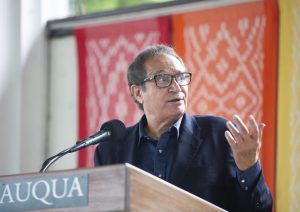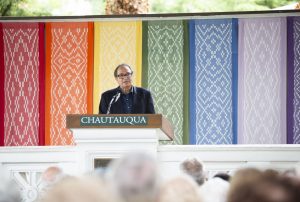
MHARI SHAW/STAFF PHOTOGRAPHER
Nikhat Noorani, for The Daily
“Is it true it was the size of a kidney bean?” asked the the Rt. Rev. V. Gene Robinson. Abdallah Daar nodded, confirming the scale.
Among Daar’s many notable accomplishments — as a doctor, surgeon, scientist and global health leader —is that he holds the record for performing the youngest cadaveric-donor kidney transplant. The donor was born premature; the recipient, just 17 months old.
Daar is a professor emeritus of global public health and of surgery at the University of Toronto, and member or chair of many world organizations, including chair of the board of advisers for the United Nations University International Institute for Global Health; chief scientific/ethics officer and chair of the International Scientific Advisory Board; and member of the governing board of Grand Challenges Canada.
Previously, Daar was a chair of the World Health Organization’s Human Genetics Program and a board member of Genome Canada. Daar, the author of Garment of Destiny: A Surgeon’s Global Identity and the Ties that Bind, gave his interfaith lecture Wednesday in the Hall of Philosophy, as part of the Week Seven Interfaith Lecture Series, “Grace: A Celebration of Extraordinary Gifts.”
A previous speaker on both the morning platform and in the Interfaith Lecture Series, Daar brings a unique perspective on global health and Islam to Chautauqua. His book and lecture serve as an “antidote for what is happening in many countries … based on dividing people to advance political fortunes,” he said.
Daar is inspired by Martin Luther King Jr., and quoted him — “In a real sense, all life is interrelated, all men are caught in an inescapable network of mutuality, tied in a single garment of destiny” — to describe the interrelated structure of reality, or the butterfly effect.
“Now for me, these words are not just aspirational. … They are a prescription for survival,” Daar said.
The oneness of humanity and coming to that idea, Daar said, is a “manifestation of grace in its highest form.”
“Grace is a manifestation of God’s mercy,” he said, and explained that Muslims acknowledge this every time they pray.
Muslim prayers always open with The Fatiha, Surah 1:1, which states: “In the name of Allah (God) the most Gracious, the most Merciful.”
“Muslims believe that the very creation of the universe and of humankind is an act of grace from Allah,” Daar said.
Grace in Islam, Daar said, is when someone takes one step toward God, and God returns it with 10 steps toward them. Looking inward at his own identity, Daar said that growing up with such a diverse background helped him to see his communities without conflict.

MHARI SHAW/STAFF PHOTOGRAPHER
Exposure to different environments to help find grace seems to be a common grounding factor in perennial wisdom, as audiences this summer have heard from Fr. Richard Rohr, OFM, in Week Four, and Rabbi Rami Shapiro on Monday. Like Shapiro’s notes on radical liberation and freedom from ideology, Daar said that “certainty is what is behind conflict, … much of certainty is driven by fear.”
Daar turns to the Persian poet Jalaluddin Rumi for the answer to this problem: “Fear is the nonacceptance of uncertainty, if we can accept uncertainty, it becomes adventure.” This resembles the command to Abraham and Sarah in Genesis 12:1, which Shapiro discussed Monday.
“Sell your cleverness, buy bewilderment,” Rumi wrote. “Cleverness is mere opinion, bewilderment is intuition.”
Daar encouraged listeners to look inward for advancement and live by humane values; that is, to treat one another humanely.
“Life has an intrinsic value and must be protected at all times. … Always use respect,” Daar said. “Be careful not to trample on the dignity of others, believe in equality — including of gender — be honest, be compassionate, believe in justice, etc.”
With a perennial view, Daar said that “all the world’s religions share a single metaphysical truth,” and moreover, even in Islam, God is unknowable, and the will and grace of God is incomprehensible — paralleling the Rev. Barbara Brown Taylor’s lens of Christian grace being unknowing and undeserving.




